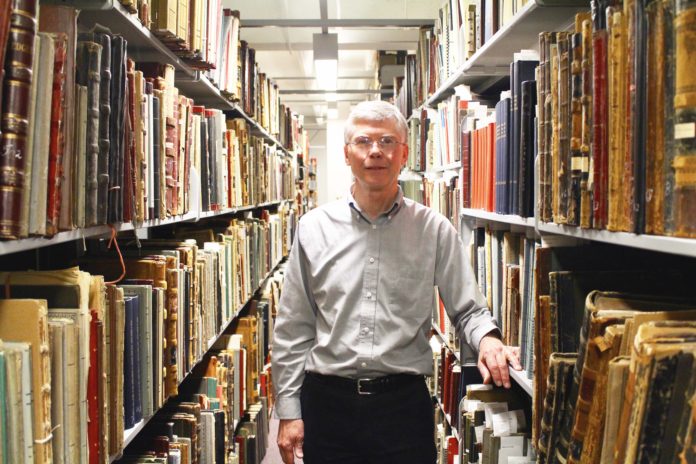
On the second floor on the Roy O. West across the stairs, an often overlooked and dimly lit and temperature controlled room holds thousands books, photographs, and artifacts. The DePauw Archives, established in 1951, is currently being updated and run by Wes Wilson.
Wilson’s office is riddled with artifacts and antiques. “My father used to collect things and put them all over his office. I’ve continued to do the same.”
On his shelves and surrounding his desk are campaign buttons, stereoscopes, and a hundred year old grandfather clock that keeps perfect time as Wilson collects, organizes, and preserves historically significant artifacts dating back to before the Civil War.
Organization is important as an archivist, since Wilson’s youth he’s always known he had the qualities that would allow him to succeed. “My brother and I shared a room growing up. My side was a lot more neat,” Wilson said.
An Ohio native, he graduated from Ohio State University majoring in Anthropology and Photography.
The DePauw archives community extends beyond DePauw faculty and staff. Wilson, with help from former Professor of History John Schlotterbeck, transcribed an entire Civil War diary from a soldier in the 18th Pennsylvania Cavalry for the Union, David H. Weaver. With the help of crowd sourcing from Flickr, the DePauw Archives transcribed the entirety of his diary.
“It’s pretty unique because he’s an educated man and he wrote a page for every day in the service and never missed a day,” Wilson said, “he talked about his services in a descriptive but objective way.”
Perhaps Wilson’s favorite era of DePauw history is what he describes as the “pioneer era” and more specifically the history of Matthew Simpson, who began his tenure as the first president at DePauw at age 26.
Simpson left DePauw in 1848 and went to Washington D.C.. As a close confidant of Abraham Lincoln, when Lincoln was assassinated, it was Simpson who gave Lincoln’s eulogy when he was laid to rest in Springfield.
“I think students need to be more well versed on the history. We’ve had incredible presidents at DePauw and it's all there for students to explore,” Wilson said.
Wilson values amateurs who are able to help archival research flourish. “It makes a lot of sense. Decades ago it wasn’t seen as important,” Wilson said. “There are so many people who are so knowledgeable in certain areas of history.”
When Wilson and archivist open up documents to others, people are allowed to annotate and comment on pieces of history and can broaden the perspective and bring the public into history. “In a way I've always tried to make history part of today,” Wilson said.
For Wilson, the photograph is the most important tool in history. He spends a lot of his time examining old photographs and aerial depictions of DePauw and other historic sights. “In those moments you can really see the difference,” Wilson said. “Sometimes history has changed the locations, other times not.”
Wilson stressed the importance of seeing one’s life in the same perspective as the ones of esteemed alumni Matthew Simpson and David H. Heaver.
“In your day to day life, you are making history.” Wilson said. “When we get experiences like someone’s scrapbook or letters home, it helps tell your DePauw story. Sometimes there are similarities and sometimes things don’t change a lot.”

